if条件句子分析
- 格式:pptx
- 大小:1.04 MB
- 文档页数:15
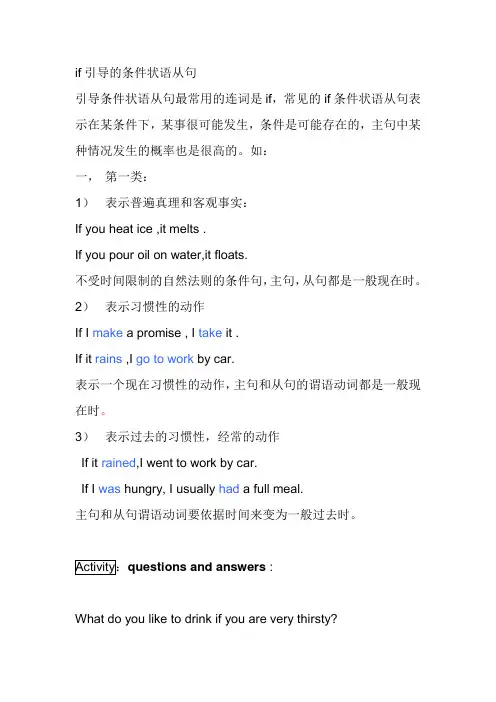
if引导的条件状语从句引导条件状语从句最常用的连词是if,常见的if条件状语从句表示在某条件下,某事很可能发生,条件是可能存在的,主句中某种情况发生的概率也是很高的。
如:一,第一类:1)表示普遍真理和客观事实:If you heat ice ,it melts .If you pour oil on water,it floats.不受时间限制的自然法则的条件句,主句,从句都是一般现在时。
2)表示习惯性的动作If I make a promise , I take it .If it rains ,I go to work by car.表示一个现在习惯性的动作,主句和从句的谓语动词都是一般现在时。
3)表示过去的习惯性,经常的动作If it rained,I went to work by car.If I was hungry, I usually had a full meal.主句和从句谓语动词要依据时间来变为一般过去时。
questions and answers :What do you like to drink if you are very thirsty?How many days are there in February it it is a leap year ? Who do people go and see if they get ill ?第二类:If we catch the 10 o’clock train ,we shall (will ,can,may,must ,should ) get there in time .If it is fine tomorrow ,we can have a picnic somewhere.If you wake up before me , give me a call .条件句(从句)用一般现在表示将来,主句用shall 加动词原型或者是祈使句在if 引导的条件状语从句中,如果从句谈论的是一个有可能发生的事实及其产生的相关的结果,主句用一般将来时态,从句用一般现在时态。
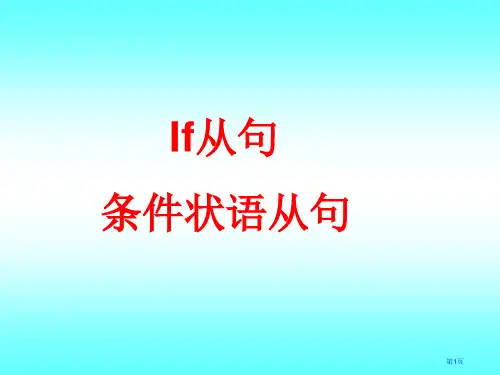
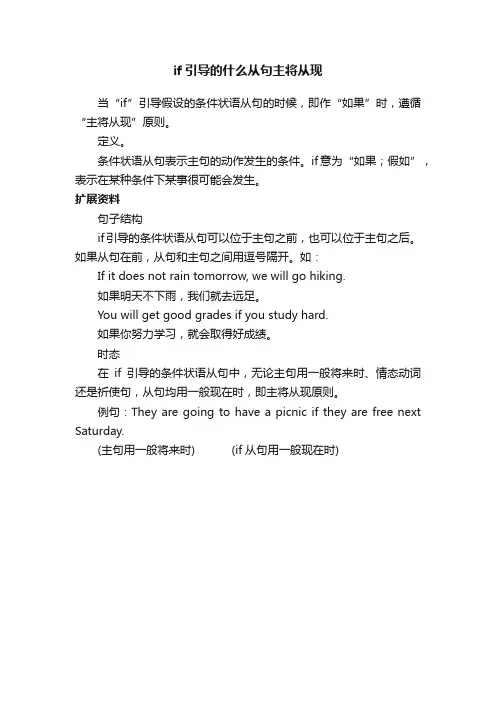
if引导的什么从句主将从现
当“if”引导假设的条件状语从句的时候,即作“如果”时,遵循“主将从现”原则。
定义。
条件状语从句表示主句的动作发生的条件。
if意为“如果;假如”,表示在某种条件下某事很可能会发生。
扩展资料
句子结构
if引导的条件状语从句可以位于主句之前,也可以位于主句之后。
如果从句在前,从句和主句之间用逗号隔开。
如:
If it does not rain tomorrow, we will go hiking.
如果明天不下雨,我们就去远足。
You will get good grades if you study hard.
如果你努力学习,就会取得好成绩。
时态
在if引导的条件状语从句中,无论主句用一般将来时、情态动词还是祈使句,从句均用一般现在时,即主将从现原则。
例句:They are going to have a picnic if they are free next Saturday.
(主句用一般将来时) (if从句用一般现在时)。
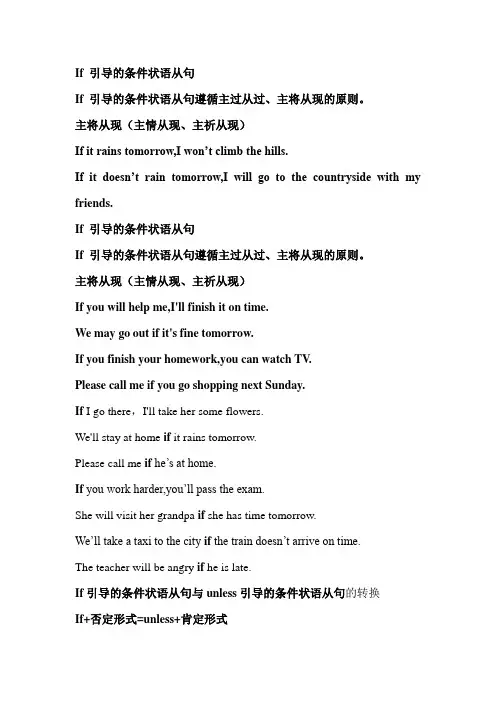
If 引导的条件状语从句If 引导的条件状语从句遵循主过从过、主将从现的原则。
主将从现(主情从现、主祈从现)If it rains tomorrow,I won’t climb the hills.If it doesn’t rain tomorrow,I will go to the countryside with my friends.If 引导的条件状语从句If 引导的条件状语从句遵循主过从过、主将从现的原则。
主将从现(主情从现、主祈从现)If you will help me,I'll finish it on time.We may go out if it's fine tomorrow.If you finish your homework,you can watch TV.Please call me if you go shopping next Sunday.If I go there,I'll take her some flowers.We'll stay at home if it rains tomorrow.Please call me if he’s at home.If you work harder,you’ll pass the exam.She will visit her grandpa if she has time tomorrow.We’ll take a taxi to the city if the train doesn’t arrive on time.The teacher will be angry if he is late.If引导的条件状语从句与unless引导的条件状语从句的转换If+否定形式=unless+肯定形式You won’t pass the exam if you don’t work hard.=You won’t pass the exam unless you work hard.If you don’t go to bed earlier,you will feel tired in the morning. =Unless you go to bed earlier,you will feel tired in the morning. If it doesn’t rain,he will play with me tomorrow.=Unless it rains,he will play with me tomorrow.If she doesn’t come,I’ll go shopping alone=Unless she comes,I’ll go shopping alone.if条件状语从句与祈使句,and/or+一般将来时的句子转化If you get up early,you’ll get there on time.=Get up early,and you’ll get there on time.=Get up early,or you won’t get there on time.If you get up early,you won't be late for school.=Get up early,and you won't be late for school.=Get up early,or you will be late for school.If you don’t get up early,you won’t catch up with the early bus. =Get up early,and you will catch up with the early bus.=Get up early,or you won’t catch up with the early bus.if条件状语从句与without的句子转化If there is no water,we can't live.=We can't live without water.If there is no water,fish will die.=Fish will die without water.If you help me,I’l l finish the work soon.=With your help,I finish the work soon.if条件状语从句与祈使句,and/or+一般将来时的句子转化If you get up early,you’ll get there on time.=Get up early,and you’ll get there on time.=Get up early,or you won’t get there on time.If you get up early,you won't be late for school.=Get up early,and you won't be late for school.=Get up early,or you will be late for school.If you don’t get up early,you won’t catch up with the early bus.=Get up early,and you will catch up with the early bus.=Get up early,or you won’t catch up with the early bus.1. your friend ,I'll tell you.eB.will comeesD.are coming2. If you go to college,you a good education.A.will getB.getC.getsD.got3.I want to know if they tomorrow.eB.will come C comes D.came4.Take enough exercise, you'll be in good heath.A.orB.soC.butD.and5.If it (not rain),he (play)basketball withme tomorrow.6.If Uncle Lan ______(come),I______(call)you up.7.She must see a dentist if she______(have)a toothache.8.Please wake me up if he______(come)back.9.Hurry up!Or you ______(be)late again.10.If you don’t be quick,you(be)late.1.We won’t wait for you you can’t arrive on time.A.untilB.whenC.afterD.if2.The children will go to the zoo if it (not rain)this Saturday.3.If she work hard,she be able to go to colleage.A.not,notB.won’t,won’tC.won’t,doesn’tD.dpesn’t,won’t4.If I run every day,I (be)healthier.5.If it (not rain),he (play)with me tomorrow.6.She must see a dentist if she (have)a toothache.7.Study hard,or you (not pass)the test.8.If you (not go)to bed earlier,you will feel tired in the morning.9.If he (be)free tomorrow,he will come to your birthday party.10.We will go to the zoo if it (not snow)tomorrow.。
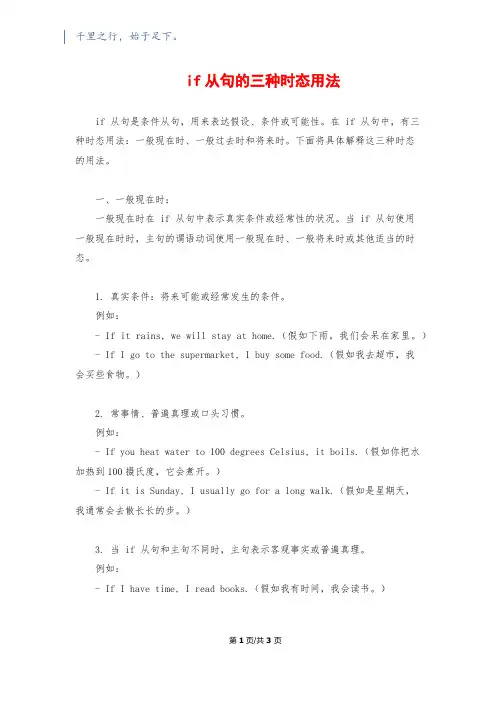
千里之行,始于足下。
if从句的三种时态用法if 从句是条件从句,用来表达假设、条件或可能性。
在 if 从句中,有三种时态用法:一般现在时、一般过去时和将来时。
下面将具体解释这三种时态的用法。
一、一般现在时:一般现在时在 if 从句中表示真实条件或经常性的状况。
当 if 从句使用一般现在时时,主句的谓语动词使用一般现在时、一般将来时或其他适当的时态。
1. 真实条件:将来可能或经常发生的条件。
例如:- If it rains, we will stay at home.(假如下雨,我们会呆在家里。
)- If I go to the supermarket, I buy some food.(假如我去超市,我会买些食物。
)2. 常事情、普遍真理或口头习惯。
例如:- If you heat water to 100 degrees Celsius, it boils.(假如你把水加热到100摄氏度,它会煮开。
)- If it is Sunday, I usually go for a long walk.(假如是星期天,我通常会去散长长的步。
)3. 当 if 从句和主句不同时,主句表示客观事实或普遍真理。
例如:- If I have time, I read books.(假如我有时间,我会读书。
)第1页/共3页锲而不舍,金石可镂。
- If he studies hard, he gets good grades.(假如他努力学习,他会取得好成果。
)二、一般过去时:一般过去时在 if 从句中表示与现在相反的状况、假设或不太可能发生的状况。
在这种状况下,主句的谓语动词使用过去将来时、过去完成时、情态动词 could 或其他适当的时态。
1. 与现在相反的状况。
例如:- If I were you, I would apologize.(假如换成是我,我会赔礼。
)- If she had time, she would visit her grandmother.(假如她有时间,她会去看她的奶奶。
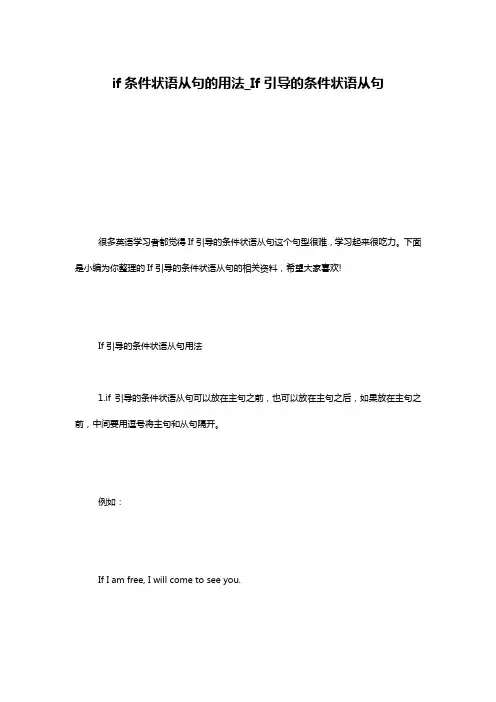
if条件状语从句的用法_If引导的条件状语从句很多英语学习者都觉得If引导的条件状语从句这个句型很难,学习起来很吃力。
下面是小编为你整理的If引导的条件状语从句的相关资料,希望大家喜欢!If引导的条件状语从句用法1.if引导的条件状语从句可以放在主句之前,也可以放在主句之后,如果放在主句之前,中间要用逗号将主句和从句隔开。
例如:If I am free, I will come to see you.= I will come to see you if I am free.如果我有空,我就来看你。
2. 在含if引导的条件状语从句的复合句中,主句用一般将来时,从句通常用一般现在时态表示将来意义,即主将从现原则。
例如:If it snows tomorrow, we will go skiing.如果明天下雪,我们就去滑雪。
3. 在含if引导的条件状语从句的复合句中,语句的谓语还可含有情态动词can、must、may等,主句也可是祈使句。
例如:If it stops raining, we can go out.如果雨停了,我们就能出去。
4. 在含if引导的条件状语从句的复合句中,如果主句部分描述的是客观事实或真理,要用一般现在时。
例如:If you heat the ice, it turns into water.如果你加热冰,它就会变成水。
if引导的非真实条件句对过去的虚拟条件从句(if):主语+had done 主句might/would/should/could+have done 对现在的虚拟if+ 主语+动词过去式(be用were)主句might/would/should/could+do对将来的虚拟if+主语+动词过去式(be用were)或主语+should do或主语+were to do主句might/would/should/could+doe.g.Tom got to the station in time because he started earlier.If Tom had started late, he would have missed the train.Do you think the thief entered through the door?No, if he had, I don't believe, he would have broken the living room window.If the book weren't so expensive, I would buy it.If you didn't live so far away, we would be able to visit you more.What would you do if you lost your passport in a foreign country?Why hasn't he come? If he should not come on time, we would have to put off the trip.2.注意事项e.g.If she hadn't work hard at English in the past, she wouldn't work as well as a secretary in a large company now. 混合时间的虚拟语气从句为对过去的虚拟,主句是现在。
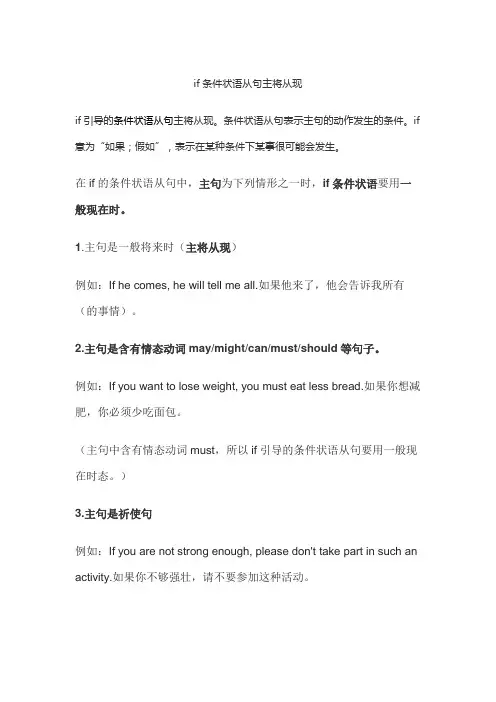
if条件状语从句主将从现
if引导的条件状语从句主将从现。
条件状语从句表示主句的动作发生的条件。
if 意为“如果;假如”,表示在某种条件下某事很可能会发生。
在if的条件状语从句中,主句为下列情形之一时,if条件状语要用一般现在时。
1.主句是一般将来时(主将从现)
例如:If he comes, he will tell me all.如果他来了,他会告诉我所有(的事情)。
2.主句是含有情态动词may/might/can/must/should等句子。
例如:If you want to lose weight, you must eat less bread.如果你想减肥,你必须少吃面包。
(主句中含有情态动词must,所以if引导的条件状语从句要用一般现在时态。
)
3.主句是祈使句
例如:If you are not strong enough, please don't take part in such an activity.如果你不够强壮,请不要参加这种活动。
(主句是一个Do型的祈使句,所以根据原则,if从句要用一般现在时态。
——不清楚Do型祈使句的小伙伴可以查看冉老师历史发文记录)。

if引导的条件状语从句[课本链接]If you do, you’ll be sorry. (Unit 5, Section A)[定义] :if引导的条件状语从句表示假如从句的动作发生,主句的动作就(不)会发生。
[句子结构]if 引导的条件状语从句位置灵活,可直接放在主句后面,也可以放在句首。
放在句首时,从句后面要用逗号和主句隔开。
如:I’ll go to see you if I have time. 如果有时间,我就去看你。
If it rains tomorrow, we’ll sta y at home. 如果明天下雨,我们就呆在家里。
[时态呼应]在复合句中:⑴ 当主句是一般现在时或是一般将来时时;(2)当主句是祈使句时;(3)当主句含有情态动词时,if引导的条件状语从句通常用一般现在时。
如:If she doesn’t come, she will be sorry. 如果她不来,她会遗憾的。
Have a good rest if you are tired. 如果累了,你就好好休息一下。
We must study hard if we want to pass the final exam. 如果想通过期末考试,我们必须努力学习。
[同义句转换]1. 用“祈使句+ and / or +一般将来时的句子”转换。
如:If you work hard, you’ll pass the exam easily. → Work hard, and you’ll pass the exam easily. 努力学习,你将很容易通过考试。
If you don’t hurry up, you’ll miss the train. → Hurry up, or you’ll miss the train. 快点儿,否则你就赶不上火车了。
2. 用含介词with或without的介词短语转换。
如:If there is no water, fish can’t live. → Fish can’t live without water. 离开水,鱼不能生存。
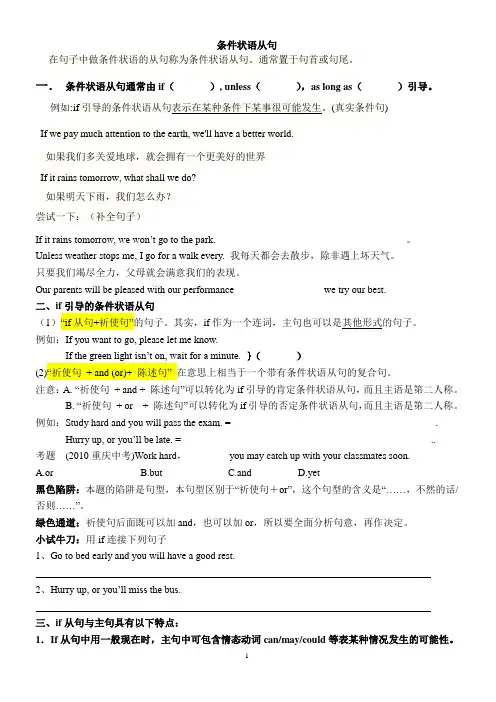
条件状语从句在句子中做条件状语的从句称为条件状语从句。
通常置于句首或句尾。
一.条件状语从句通常由if(), unless(),as long as()引导。
例如If we pay much attention to the earth, we'll have a better world.如果我们多关爱地球,就会拥有一个更美好的世界If it rains tomorrow, what shall we do?如果明天下雨,我们怎么办?尝试一下:(补全句子)If it rains tomorrow, we won’t go to the park.______________________________________。
Unless weather stops me, I go for a walk every. 我每天都会去散步,除非遇上坏天气。
只要我们竭尽全力,父母就会满意我们的表现。
Our parents will be pleased with our performance _____ _____ ______ we try our best.二、if引导的条件状语从句(1)“if从句+祈使句”的句子。
其实,if作为一个连词,主句也可以是其他形式的句子。
例如:If you want to go, please let me know.If the green light isn’t on, wait for a minute.}()(2)“祈使句+ and (or)+ 陈述句” 在意思上相当于一个带有条件状语从句的复合句。
注意:A. “祈使句+ and + 陈述句”可以转化为if引导的肯定条件状语从句,而且主语是第二人称。
B. “祈使句+ or + 陈述句”可以转化为if引导的否定条件状语从句,而且主语是第二人称。
例如:Study hard and you will pass the exam. =_________________________________________.Hurry up, or you’ll be late. =__________________________________________________..考题(2010重庆中考)Work hard,________ you may catch up with your classmates soon.A.orB.butC.andD.yet黑色陷阱:本题的陷阱是句型,本句型区别于“祈使句+or”,这个句型的含义是“……,不然的话/否则……”。
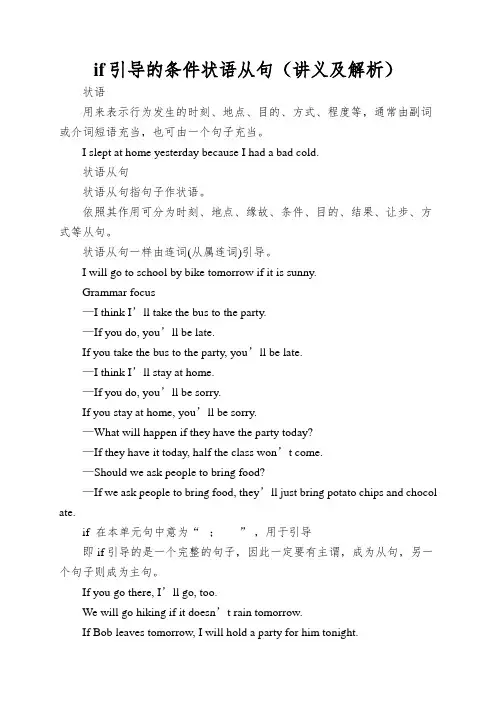
if引导的条件状语从句(讲义及解析)状语用来表示行为发生的时刻、地点、目的、方式、程度等,通常由副词或介词短语充当,也可由一个句子充当。
I slept at home yesterday because I had a bad cold.状语从句状语从句指句子作状语。
依照其作用可分为时刻、地点、缘故、条件、目的、结果、让步、方式等从句。
状语从句一样由连词(从属连词)引导。
I will go to school by bike tomorrow if it is sunny.Grammar focus—I think I’ll take the bus to the party.—If you do, you’ll be late.If you take the bus to the party, you’ll be late.—I think I’ll stay at home.—If you do, you’ll be sorry.If you stay at home, you’ll be sorry.—What will happen if they have the party today?—If they have it today, half the class won’t come.—Should we ask people to bring food?—If we ask people to bring food, they’ll just bring potato chips and chocol ate.if 在本单元句中意为“;”,用于引导即 if 引导的是一个完整的句子,因此一定要有主谓,成为从句,另一个句子则成为主句。
If you go there, I’ll go, too.We will go hiking if it doesn’t rain tomorrow.If Bob leaves tomorrow, I will hold a party for him tonight.if 引导的条件状语从句既能够放在主句前,也可放在主句后。
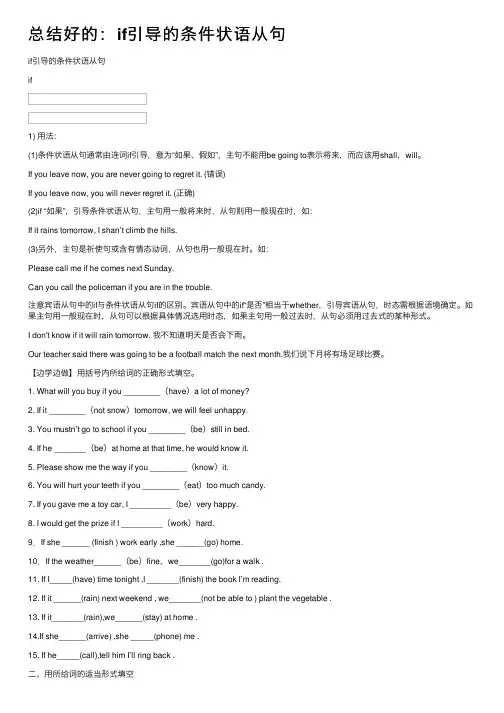
总结好的:if引导的条件状语从句if引导的条件状语从句if1) ⽤法:(1)条件状语从句通常由连词if引导,意为“如果、假如”,主句不能⽤be going to表⽰将来,⽽应该⽤shall,will。
If you leave now, you are never going to regret it. (错误)If you leave now, you will never regret it. (正确)(2)if “如果”,引导条件状语从句,主句⽤⼀般将来时,从句则⽤⼀般现在时,如:If it rains tomorrow, I shan’t climb the hills.(3)另外,主句是祈使句或含有情态动词,从句也⽤⼀般现在时。
如:Please call me if he comes next Sunday.Can you call the policeman if you are in the trouble.注意宾语从句中的if与条件状语从句if的区别。
宾语从句中的if“是否”相当于whether,引导宾语从句,时态需根据语境确定。
如果主句⽤⼀般现在时,从句可以根据具体情况选⽤时态,如果主句⽤⼀般过去时,从句必须⽤过去式的某种形式。
I don't know if it will rain tomorrow. 我不知道明天是否会下⾬。
Our teacher said there was going to be a football match the next month.我们说下⽉将有场⾜球⽐赛。
【边学边做】⽤括号内所给词的正确形式填空。
1. What will you buy if you ________(have)a lot of money?2. If it ________(not snow)tomorrow, we will feel unhappy.3. You mustn’t go to school if you ________(be)still in bed.4. If he _______(be)at home at that time, he would know it.5. Please show me the way if you ________(know)it.6. You will hurt your teeth if you ________(eat)too much candy.7. If you gave me a toy car, I _________(be)very happy.8. I would get the prize if I _________(work)hard.9.If she ______ (finish ) work early ,she ______(go) home.10.If the weather______(be)fine,we_______(go)for a walk .11. If I_____(have) time tonight ,I _______(finish) the book I’m reading.12. If it ______(rain) next weekend , we_______(not be able to ) plant the vegetable .13. If it_______(rain),we______(stay) at home .14.If she______(arrive) ,she _____(phone) me .15. If he_____(call),tell him I’ll ring back .⼆、⽤所给词的适当形式填空1. If you ________(feel) tired, you _________ (have) to have a rest.2. Where _____ he ____(see) the film if he _________(have) time?3. If there ____ (be) fewer trees, there _______ (be) more pollution.4. He ___ (dress) more casually if he ___ (not work) on weekends.5. If Marcia _______ (live) alone, she _______ (keep) a pet parrot.6. Lana _____ (buy) a new dress if the old one ____ (be) out of style.7. The twins _______ (fight) if they__________ (argue).8. I ______ (have) a bake sale if I ____ (need) money for education.9. Peter ____ (send) me a beautiful souvenir if he ____(tour) Spain.10. If Mr. Green _______ (say) I am hard- working, my parents ___ (feel) glad.11. I ______ (go) to the beach if it________ (not rain) this week.12. _____they ___ (have) a match if the P.E. teacher __ (be) busy?13. He ____ (write) a letter to his grandparents if he ____ (get) his report card this week.14. If she ______ (get) up late, she _____ (not catch) the early bus.15. Peter ____ (major) in English if he ____(pass) the exams in Peking University.⼆、完成句⼦1. 他如果看电视太久了,他的⽗母会不⾼兴。
条件状语从句一、条件状语从句通常由if(如果), unless(除非),as long as(只要)引导。
例如:If it rains tomorrow, we won’t go to the park. 如果明天下雨,我们就不去公园了。
Unless weather stops me, I go for a walk every. 我每天都会去散步,除非遇上坏天气。
Our parents will be pleased with our performance as long as we try our best.小试牛刀:1、只要我们竭尽全力,父母就会满意我们的表现。
Our parents will be pleased with our performance _____ _____ ______ we try our best.2、如果人人为保护环境做出贡献,世界将会变得更美好。
______ ______ ______ _____ _______ to protecting the environment, the world will become much more beautiful.二、if引导的条件状语从句(1)“if从句+祈使句”的句子。
其实,if作为一个连词,主句也可以是其他形式的句子。
例如:If you want to go, please let me know.If the green light isn’t on, wait for a minute.(2)“祈使句+ and (or)+ 陈述句” 在意思上相当于一个带有条件状语从句的复合句。
注意:A. “祈使句+ and + 陈述句”可以转化为if引导的肯定条件状语从句,而且主语是第二人称。
B. “祈使句+ or + 陈述句”可以转化为if引导的否定条件状语从句,而且主语是第二人称。
例如:Study hard and you will pass the exam. =If you study hard, you will pass the exam.Hurry up, or you’ll be late. =If you don’t hurry up, you’ll be late.考题(2010重庆中考)Work hard,________ you may catch up with your classmates soon.A.orB.butC.andD.yet思路解析:本句是“祈使句+and”的句型,句意为“努力学习,你会很快赶上其他同学的”,and在句中表示承接关系,所以选C项。
if引导的条件状语从句讲解和练习(答案)编辑整理:尊敬的读者朋友们:这里是精品文档编辑中心,本文档内容是由我和我的同事精心编辑整理后发布的,发布之前我们对文中内容进行仔细校对,但是难免会有疏漏的地方,但是任然希望(if引导的条件状语从句讲解和练习(答案))的内容能够给您的工作和学习带来便利。
同时也真诚的希望收到您的建议和反馈,这将是我们进步的源泉,前进的动力。
本文可编辑可修改,如果觉得对您有帮助请收藏以便随时查阅,最后祝您生活愉快业绩进步,以下为if引导的条件状语从句讲解和练习(答案)的全部内容。
条件状语从句一、条件状语从句通常由if(如果), unless(除非),as long as(只要)引导。
例如:If it rains tomorrow, we won’t go to the park. 如果明天下雨,我们就不去公园了。
Unless weather stops me, I go for a walk every。
我每天都会去散步,除非遇上坏天气.Our parents will be pleased with our performance as long as we try our best。
小试牛刀:1、只要我们竭尽全力,父母就会满意我们的表现。
Our parents will be pleased with our performance _____ _____ ______ we try our best.2、如果人人为保护环境做出贡献,世界将会变得更美好.______ ______ ______ _____ _______ to protecting the environment, the world will become much more beautiful。
二、if引导的条件状语从句(1)“if从句+祈使句”的句子.其实,if作为一个连词,主句也可以是其他形式的句子.例如:If you want to go, please let me know.If the green light isn’t on, wait for a minute.(2)“祈使句 + and (or)+ 陈述句" 在意思上相当于一个带有条件状语从句的复合句。
千里之行,始于足下。
if句式的用法if句式是英语中常用的一种条件句句式,其结构为“if + 条件句,主句”。
if句式用来表达假设、条件、可能性等含义。
在下面的文章中,我将具体介绍if句式的用法,并举例说明。
一、表示真实状况的if句式假如if后面的条件句表示的是实际上存在的状况,那么主句中的内容就是对这个存在状况所作出的描述或推断。
例句1:If it rains, we will stay at home.假如下雨,我们就呆在家里。
例句2:If you study hard, you will pass the exam.假如你努力学习,你就会通过考试。
例句3:If she is tired, she goes to bed early.假如她累了,她就早点睡觉。
二、表示假设状况的if句式假如if后面的条件句表示的是一种假设、虚拟的状况,那么主句中的内容通常是对这种假设状况所作出的推断、建议或者标明可能性。
例句1:If I were you, I would apologize to her.假如我是你,我会向她赔礼。
例句2:If you had studied harder, you would have passed the exam.假如你更努力学习了,你本可以通过考试的。
第1页/共3页锲而不舍,金石可镂。
例句3:If it doesn't rain tomorrow, we will have a picnic.假如明天不下雨,我们就去野餐。
三、表示习惯、规章的if句式if句式还可以用来表达习惯、规章、定理等。
例句1:If you heat water to 100 degrees Celsius, it boils.假如你将水加热到100摄氏度,它就会沸腾。
例句2:If it is Sunday, I always go shopping.假如是星期天,我总是去购物。
例句3:If you touch fire, you will get burned.假如你触碰火,你会被烧伤。
全面解析由if引导的条件状语从句 如果要认识条件状语从句,我们就有必要认识一下状语从句。
所谓的状语从句,就是在复合句中,由从句表示状语的句子。
而条件状语从句,一般就是由引导词unless或者if引导的状语从句。
今天,我们要说的条件状语从句,主要是从“if”的角度来说的。
if引导的条件状语从句: 通常来说,引导条件状语从句最常用的连词就是if。
if条件状语从句一般表示在某条件下,某事很可能发生,条件是可能存在的,主句中某种情况发生的概率也是相当高的。
例句:If we mingle with the crowd, we shall not be noticed. 如果我们混在人群里,就不会被注意到了。
They will allocate funds to you if you requisition it. 如果你提出书面申请,他们就会拨给你资金。
此外,if从句还表示不可实现的条件或者根本不可能存在的条件,也就是一种虚拟的条件或者假设。
从句多用一般过去时或者过去完成时,通常表示对现在或者过去的一种假设。
例句:I would have arrived much earlier if I had not been caught in the traffic.要不是交通堵塞,我本会来得早一些。
if 条件句的时态搭配: 1.如果if从句用一般现在时,主句则用一般将来时 例句:If she runs she’ll get there in time. 如果她用跑的,她就会及时赶到那儿。
2.如果if从句用一般现在时,主句则用may/might/can 例句:If it stops raining we can go out. 如果雨停了,我们就可以出去。
3.如果if从句用一般现在时,主句则用must/should 例句:If you want to lose weight you must/should eat less cake. 如果你想减肥,你必须少吃蛋糕。